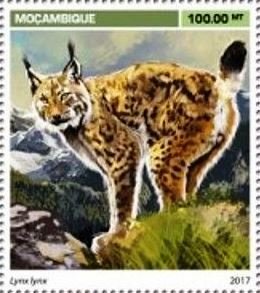Stamp: Lynx lynx (Mozambique 2017)
Lynx lynx (Mozambique 2017)
10 February (Mozambique ) within release Big cats goes into circulation Stamp Lynx lynx face value 100 Mozambican metical
| Stamp Lynx lynx in catalogues | |
|---|---|
| Colnect codes: | Col: MZ 2017-37/2 |
Stamp is square format.
Although this issue was authorized by the postal administration of Mozambique, the issue was not placed on sale in Mozambique, and was only distributed to the new issue trade by Mozambique's philatelic agent.Also in the issue Big cats:
- Stamp - Puma concolor face value 100;
- Stamp - Lynx lynx face value 100;
- Souvenir Sheet - Panthera tigris amoyensis face value 350;
- Stamp - Panthera leo nubica face value 100;
- Souvenir Sheet - Big cats face value 4*100;
- Stamp - Panthera pardus fusca face value 100;
|
Data entry completed
50%
|
|
|---|---|
| Stamp Lynx lynx in digits | |
| Country: | Mozambique |
| Date: | 2017-02-10 |
| Emission: | Commemorative |
| Format: | Stamp |
| Face Value: | 100 Mozambican metical |
Stamp Lynx lynx it reflects the thematic directions:
Animals are multicellular, eukaryotic organisms of the kingdom Animalia (also called Metazoa). All animals are motile, meaning they can move spontaneously and independently, at some point in their lives. Their body plan eventually becomes fixed as they develop, although some undergo a process of metamorphosis later on in their lives. All animals are heterotrophs: they must ingest other organisms or their products for sustenance.
The fishing cat (Prionailurus viverrinus) is a medium-sized wild cat of South and Southeast Asia. It has a deep yellowish-grey fur with black lines and spots. Adults have a head-to-body length of 57 to 78 cm (22 to 31 in), with a 20 to 30 cm (7.9 to 11.8 in) long tail. Males are larger than females weighing 8 to 17 kg (18 to 37 lb); females average 5 to 9 kg (11 to 20 lb). Since 2016, it is listed as Vulnerable on the IUCN Red List. Fishing cat populations are threatened by destruction of wetlands and have declined severely over the last decade. The fishing cat lives foremost in the vicinity of wetlands, along rivers, streams, oxbow lakes, in swamps, and mangroves.


